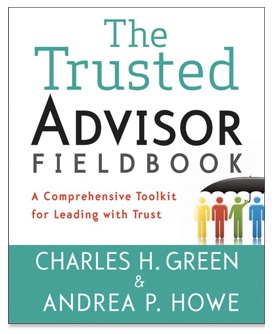 Being able to quickly develop trust is essential for sales prospecting success and account growth. To learn more, check out my interview with Charlie Green, co-author of the hot new Trusted Advisor Fieldbook and developer of the TQ (Trust Quotient) Assessment.
Being able to quickly develop trust is essential for sales prospecting success and account growth. To learn more, check out my interview with Charlie Green, co-author of the hot new Trusted Advisor Fieldbook and developer of the TQ (Trust Quotient) Assessment.
Interview
Jill: Charlie, recently I took your TQ Assessment. I understand you developed it by surveying over 12,000 people to get their trust profile. Can you give us a quick overview of the TQ?
Charlie: The TQ focuses on the 4 components of trustworthiness — Credibility, Reliability, Intimacy, & Self-orientation. The first three are positive attributes, the last is negative. The TQ score itself is computed as (C + R + I) / S.
Jill: It only took a few minutes online, and I instantly got a cool report from you. (Take the free assessment here.) It says that my TQ was 14, which was higher than average. But what really stuck out for me was the Trust Temperaments. Can you explain what those are?
Charlie: The Trust Temperaments are based on your two highest component scores. For example, people whose strengths are credibility and reliability we classify as “experts.” The other possible categories are the Professor, the Doer, the Catalyst, the Connector, and the Steward.
Jill: I was the Steward type. It pretty much nailed my strengths and weaknesses.
Charlie: I'm always glad to hear that. And it fits with my image of you too - giving, other-oriented, and extremely dependable.
Jill: Are all the Trust Temperament good? Or are some better than others?
Charlie: There are statistically significant differences in the TQ score across most of these groups. Some simply are more trustworthy than others.
Jill: So, who are the more trustworthy groups and types?
Charlie: Well, first of all, women are more trustworthy than men. And that's because they are better at one particular trait - intimacy. And intimacy, as it turns out, is the common variable in all three of the top-rated Trust Temperaments.
Jill: Wow. And, as a women, I'm not surprised! What about credentials and track records? Are they simply irrelevant today and all we need to do is get up close and personal with our customers?
Charlie: No, though credentials and the like are over-rated. The right way to think about it - and this is consistent with leading sales thinkers like Neil Rackham - is that data, credentials and logic are necessary but not sufficient for selling. People need to know that you care. They buy with their heart and rationalize it with their brains.
Jill: Makes a lot of sense to me! Let's talk about The Trusted Advisor Fieldbook. It's a real how-to type of book.
Charlie: We intended it to be intensely practical. We cover a broad range of practical trust problems. And we offer enabling questions, lists and worksheets.
Jill: Has trust changed since you wrote your first book, The Trusted Advisor?
Charlie: No - but the world has. It has gotten flatter, looser, cloud-based, wired, decentralized, networked, disaggregated, more horizontal, and more malleable. Leadership is no longer a set of skills for a few leaders to manage vertically.
It now has to be a broad set of skills useable by everybody -- including salespeople -- to achieve influence where they have no control.
Jill: Yes, salespeople today do need to lead. And they need to develop trust -- quickly and consistently. Charlie, thanks so much for talking with us.
To learn more, click here to read more about The Trusted Advisor Fieldbook. And, you can take the TQ Assessment here.